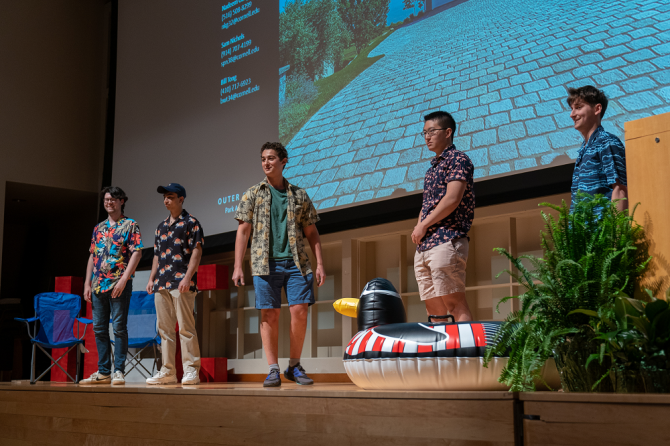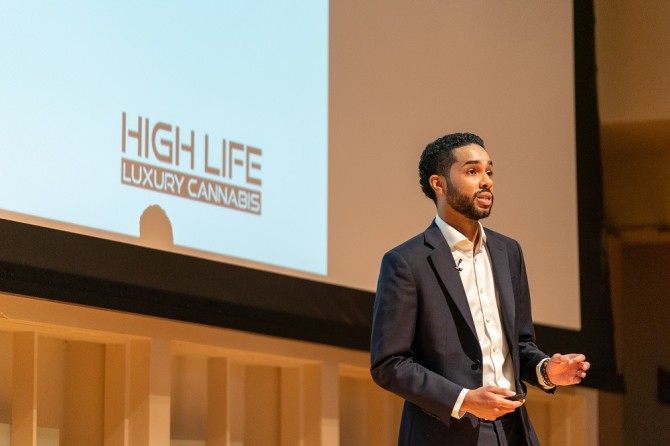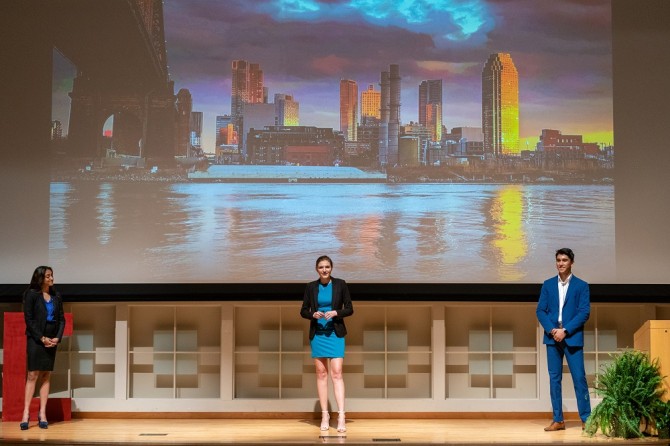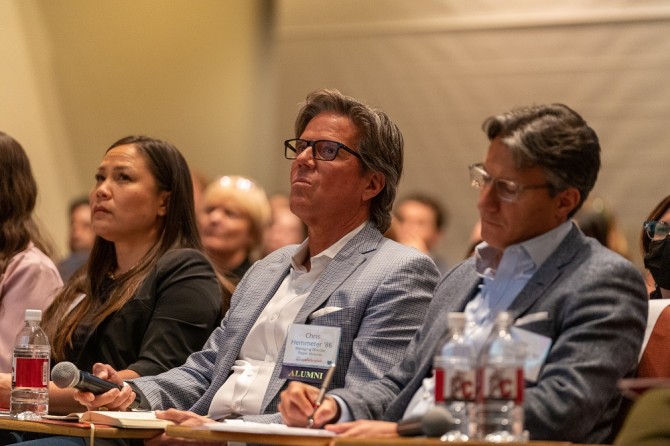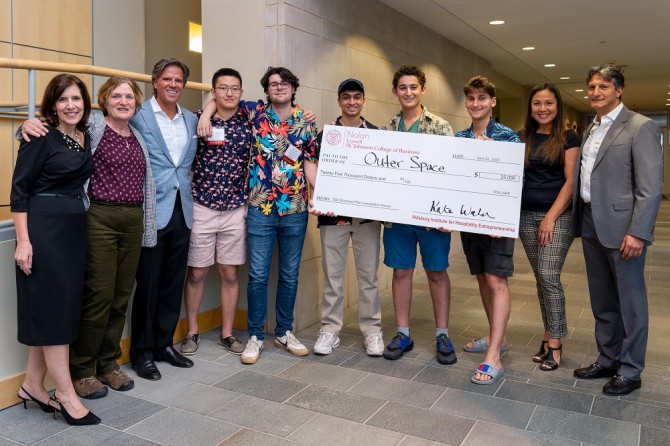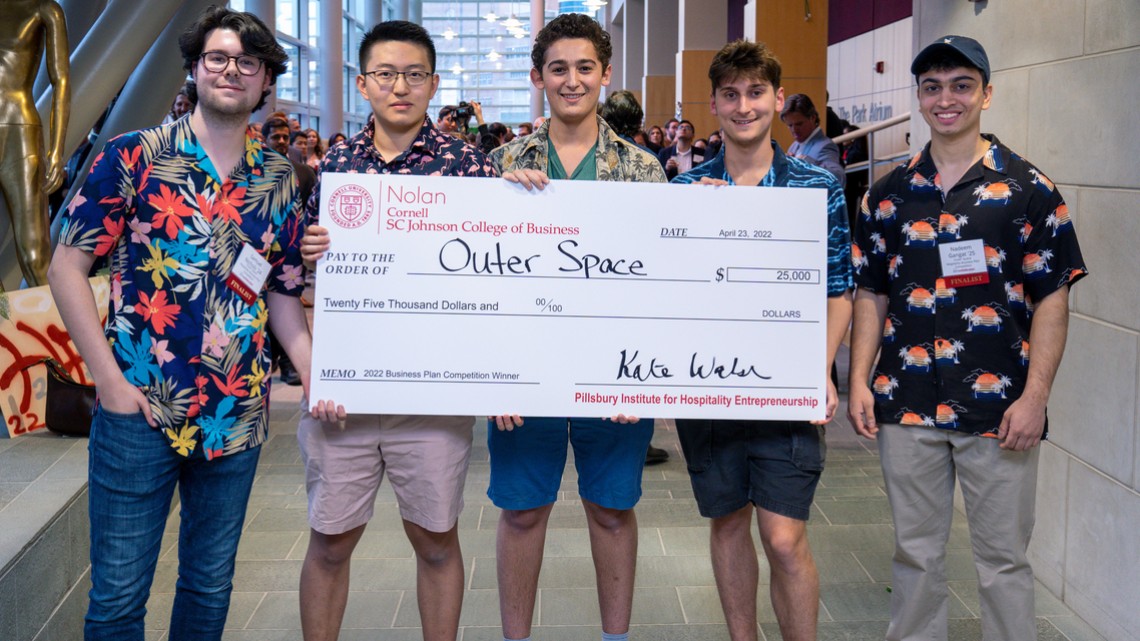
News directly from Cornell's colleges and centers
App connecting driveways with beachgoers wins hospitality business contest
By Stephen D'Angelo
A farm-to-table styled restaurant, atop barge-decks, docked in waterfront cities and a startup aimed at providing automated robotic solutions for restaurant kitchens were among the pitches presented during the 12th Cornell Hospitality Business Plan Competition, an annual entrepreneurship event that presents cash prizes for the top three finalists.
Hosted in-person, for the first time in two years, on April 23 by the Cornell Peter and Stephanie Nolan School of Hotel Administration’s Pillsbury Institute for Hospitality Entrepreneurship (PIHE), the competition’s $25,000 first prize went to a concept addressing the problem of overparking at leisure destinations, allowing property owners to rent out their driveway or parking spaces on an hourly basis to the weekend warrior tourist consumer.
“Parking is actually really hard, and in a lot of circumstances there aren’t enough spaces at popular destinations,” said Alex Barr ’24, who originally came up with the idea for Outer Space when trying to find parking for a day of surfing on Long Island. “Some people plan their entire day of a beach trip, just so they can get there early enough to get a spot.
“And, if you drive an electric vehicle, you may be straight out of the luck because the infrastructure in these locations isn’t strong enough to charge up your car while you’re spending the day at the beach.”
According to Barr and the Outer Space team, which also included Samuel Nichols ’24. Jude Rizzo ’25, Nadeem Gangat ’25, Bill Tong ’24, when beachgoers, weekend warriors, and summer day trip travelers can’t find parking, congestion begins in the parking lot and then creeps into the street, surrounding neighborhoods, and even the centers of beach towns. Some will decide to park illegally, which is an issue, especially on private and protected land. Not to mention the risk to pedestrians and cyclists.
“This ultimately causes a lot of stress, so a lot of times, many will just give up and leave, which is a detriment to the town,” Barr said. “This is because a lot of these destinations are seasonal and it is the only time of the year they actually make money.”
Outer Space helps ease parking frustrations, according to Barr, by connecting business or homeowners, who have extra space in a desirable destination, to list their space on the app for passive income from users of the app seeking to find a spot.
Barr says participating homeowners and small businesses in seasonal locations like Montauk, where the group will pilot the app this summer, will benefit greatly. “They can generate additional income throughout the summer without having to put in any effort, which will help them survive the off- season.”
Further, to help electric vehicle owners, in areas where recharging infrastructure may be minimal or simply not developed yet, by highlighting private charging stations in driveways and garages available through owners willing to rent the stations by the hour.
After a summer in Montauk, Barr and the Outer Space team plan to expand to other sea towns, state and national parks, and other vacation spots.
The second-place pitch, winning $7,500, High Life Luxury Cannabis offers the ultimate luxury cannabis lifestyle brand through hospitality, fashion, and technology by enabling cannabis connoisseurs to create unforgettable memories through a combination of top-quality products, events, and experiential spaces. Team members included Raul Gamble MMH '22 and Cody Perez MBA '22, MPS-RE '22.
In third place, winning $5,000, was Quay Side Farm and Table, which aims to take advantage of available sea-faring barges for restaurant space, literally on the water, providing guests with locally-sourced seasonal foods. Team members included Ariel Staffin '22, Kenisha Paliwal '22, and Vishwajit Sharma '23.
Honorable mentions went to Takamichi Matsuhisa MMH ’22, Alexander Vias MMH ’22, Zihan Sun MEng ’22, and Tony Ling MMH ’22 for their high-end beverage investment alternative pitch, Vine; as well as Yingtong Li '23, Jack Ma MMH '23; Mokhtar Rajai '22; Elizabeth Vicarte '22; Mi Yan MS '22, for their robotic and automated cooking startup, MiFood Tech.
This year’s final judges included Yaniv Blumenfeld ’95, founder and managing partner of Glacier Global Partners LLC; Chris Hemmeter ‘86, managing director of Thayer Ventures ; and Meli James ’00, co-founder of Mana Up and president of Hawaii Venture Capital Association.
The competition, open to students from across Cornell, is a program of the Leland C. and Mary M. Pillsbury Institute for Hospitality Entrepreneurship. Beginning at the start of the academic year, students form teams and develop pitches for their business ideas. The field is narrowed down to 10 semifinalist teams, who submit full business plans. Five teams from that group are then chosen to go to the finals, where they make their presentations to an industry-panel that selects three winners.
“This competition is one of the highlight events of the programming that we carry out from the Pillsbury Institute throughout the year that give our students from across the university the opportunity to engage in experiential learning,” said Linda Canina, academic co-director at PIHE and professor of finance at Cornell Nolan.
Canina said the business plan competition process provides students with the opportunity to develop their idea and their business proposals as they would in the ‘real world’ in an educational and supportive environment. Throughout this experiential learning program, students are guided in the development and substantiation of their idea through their courses, additional lectures offered through the BPC program, and the guidance from experienced entrepreneurs, alumni and other industry partners organized by the Pillsbury Institute for Hospitality Entrepreneurship.
“This is one of the learning experiences that the Nolan School is noted for—the many experiential learning opportunities we give, not just to Nolan students, but to all students across the university; real-life experiences that give them practice developing and implementing their ideas by collaborating with students from different backgrounds and interests, preparing them for their future careers.
Full details on this year’s Cornell Hospitality Business Plan Competition, including a link to the presentations recording, can be viewed online.
Media Contact
Get Cornell news delivered right to your inbox.
Subscribe